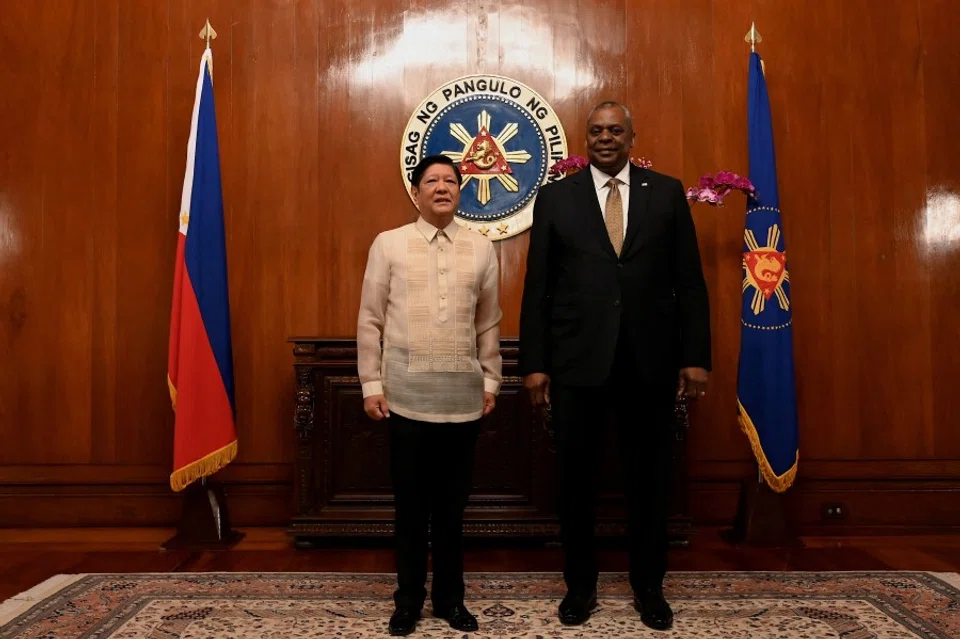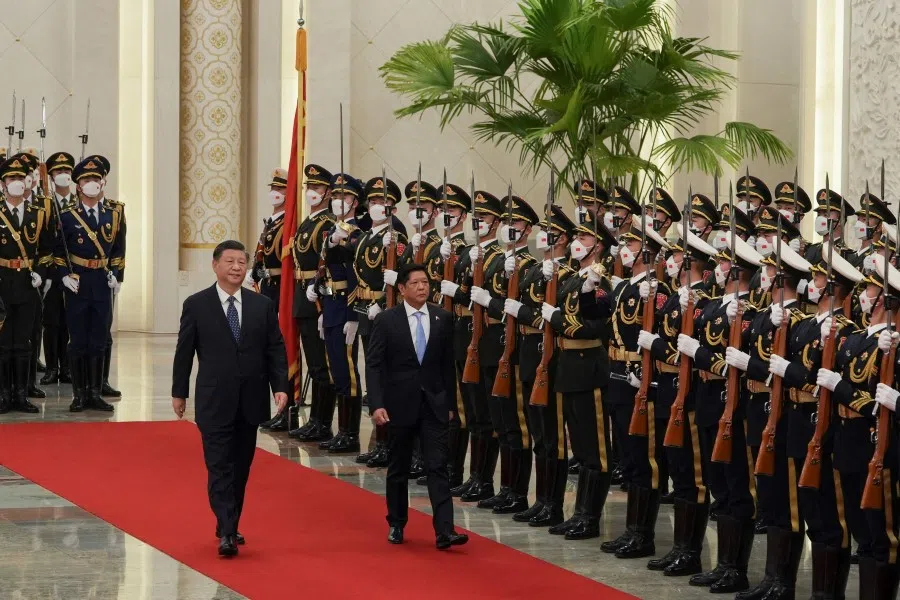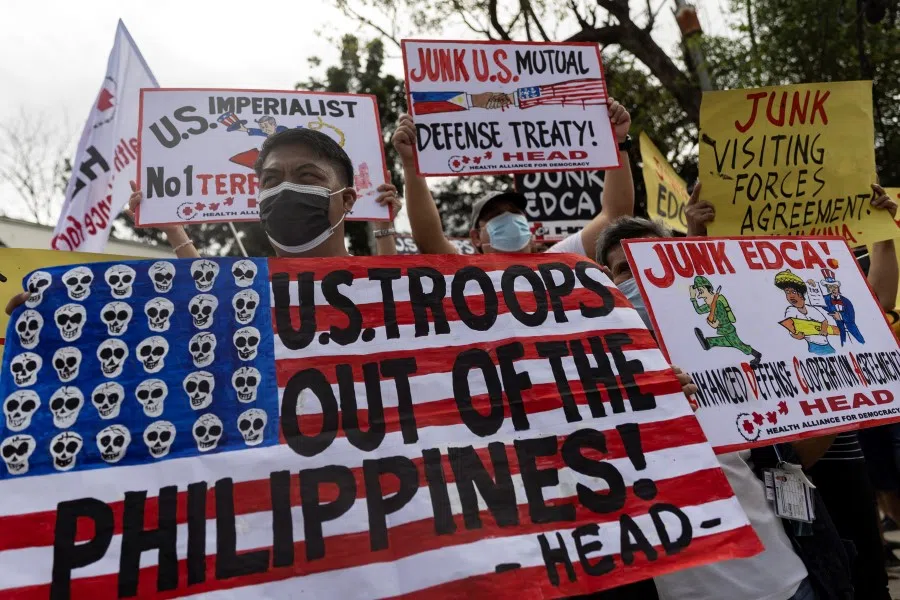Chinese academic: The Philippines' closer ties with US could cross China's bottom line
Chinese academic Peng Nian looks at the US expanding its access to new military bases in the Philippines, which China is particularly concerned with. He says that while the Philippines want to find a sweet spot in navigating China-US competition, it must be extra vigilant in dealing with security cooperation with the US in the South China Sea so as not to aggravate China-Philippines relations.

Less than a month after Philippine President Ferdinand Marcos Jr made his first visit to China at the beginning of this year, US Defence Secretary Lloyd Austin made a reciprocal visit with an important mission to expand the US's military footprint in the country and the US was granted access to four new military bases in the Philippines.
With the new development, the US will now have access to a total of nine bases in the Philippines under the US-Philippines Enhanced Defense Cooperation Agreement (EDCA). The two sides also agreed to expand the EDCA signed in 2014, which currently allows US access to Philippine bases for joint training, pre-positioning of equipment and building of facilities such as runways, fuel storage and military housing.
Reviving US-Philippines relations
It seems that US-Philippines relations have overcome the troughs and reached new peaks - from February 2020 when former Philippines President Rodrigo Duterte abruptly terminated the Visiting Forces Agreement, to November 2021 when the Joint Vision for a 21st Century United States-Philippines Partnership was announced, and to March 2022 when the Balikatan joint military exercise was restored.
Subsequently, during his widely supported presidential election campaign, Marcos Jr said that he would maintain the Philippines' alliance with the US, noting that military deals between the US and the Philippines "are advantageous to both countries". He also stated that the alliance between the two nations is "a special relationship", and the US "can do many things" to help the Philippines. In September 2022, less than six months after being elected as president, Marcos Jr made his first visit to the US, actively pushing to revive US-Philippines relations.
This current visit by Austin to the Philippines is not a matter of routine, but a real effort to ramp up US-Philippines military cooperation, with the intention of making the Philippines an important part of US plans to contain China in the waters around the South China Sea and the Taiwan Strait.
Duterte's foreign policy of moving away from the US and closer to China can only be seen as an exception rather than the norm.

This also seems to bear out previous speculation that the Philippines' foreign policy would inevitably shift after Duterte stepped down. Perhaps as Philippine academic Joseph Ching Velasco said in his article "Examining the Philippines' China Policy: Great Powers and Domestic Politics", growing domestic differences and the lack of strong domestic support make it difficult to establish a firm foundation for the Philippines' pro-China policy in the long term - Duterte's foreign policy of moving away from the US and closer to China can only be seen as an exception rather than the norm.
This could be interpreted in two ways. First, the Philippines' foreign policy of leaning towards China lacked strong long-term public support, which made it short-lived and unsustainable. Second, the Philippines' foreign policy will go back to normal: neither anti-US nor pro-China. Hence, former Philippines President Benigno Aquino III's anti-China, pro-US policy and Duterte's anti-US, pro-China policy were both exceptions rather than the norm.
Balance between China and the US
Marcos Jr is now bringing the Philippines' foreign policy back to normal by maintaining a prudent balance between China and the US. On the one hand, he does not want to follow Duterte's policy of hostility towards the US, and looks forward to maintaining a close relationship with the US in military cooperation relating to national security.
On the other hand, he has carried on Duterte's policy of friendliness and close economic cooperation with China, and is keen to draw Chinese investment to the Philippines to drive its economic recovery and infrastructure construction. This was evident in his visits to the US and China after taking office.
... analysts believe that bases on Luzon Island near Taiwan and Palawan Island near the South China Sea could be among the four military bases that the Philippines will open to the US military.
However, amid a harsh internal and external environment such as the intensifying strategic tussling between China and the US, as well as swelling domestic nationalism, Marcos Jr's balancing act is being sorely tested.
For example, China is concerned with the new military bases. In particular, analysts believe that bases on Luzon Island near Taiwan and Palawan Island near the South China Sea could be among the four military bases that the Philippines will open to the US military.

With the US provoking China in the South China Sea and Taiwan Strait, China is especially concerned about targeted and purposeful military cooperation between its neighbours and the US. Such negative sentiments would spill over to bilateral relations at some point and impact normal exchanges, especially economic and trade cooperation.
... it needs to seriously consider developing relations with the US within acceptable bounds or the bottom line for China...
So, the Philippines needs to accurately grasp the limits of its defence cooperation with the US, and how much China can accept. In other words, if the Philippines wants its own balancing act to work, it needs to seriously consider developing relations with the US within acceptable bounds or the bottom line for China, and minimise the impact of US-Philippines cooperation on China-Philippines relations. If there is a slip towards the track of Aquino, the losses would outweigh the benefits.
But looking at the current situation, the Philippines remains clear-headed in emphasising that its military cooperation with the US "does not target any specific third party", which is also one of the crucial conditions for the Philippines' careful balance between China and the US.
Managing domestic sentiments and opinions
Furthermore, effectively managing the South China Sea dispute and avoiding domestic backlash is also a long-standing difficulty for Marcos Jr in balancing China and the US.
... the Philippines also needs to keep an appropriate balance between satisfying domestic public sentiment and preventing the South China Sea issue from escalating.
On the one hand, the Philippines must remain firm in its strategy and should draw a line between normal military cooperation with the US, and getting involved in the US's competition with China in the South China Sea.
On the other hand, with the Philippines' opposition using the South China Sea issue to gather public support and pressure the Marcos administration, the Philippines also needs to keep an appropriate balance between satisfying domestic public sentiment and preventing the South China Sea issue from escalating.

For example, the Philippines' protest against the Chinese coastguard's use of lasers against its boats at Second Thomas Shoal has caused a clamour over the overall stability of the South China Sea. The Philippines' move seems out of place, especially after Indonesia's positive call to intensify talks on the Code of Conduct in the South China Sea.
Indeed, amid the intensifying big power competition and domestic populism, small and medium countries including the Philippines will face increasing difficulties in the diplomacy of balancing big powers. The situation calls for clear-headedness, restraint and flexibility on the part of their leaders.
Marcos Jr said at this year's Davos forum that the South China Sea issue "keeps you up at night" and "you have to pay attention to it to make sure that you are at least aware of the present situation so that you're able to respond". One careless move, and the Philippines' balancing act will slip into risky uncontrollable territory.
This article was first published in Lianhe Zaobao as "菲律宾的中美平衡术能走多远?".



![[Big read] When the Arctic opens, what happens to Singapore?](https://cassette.sphdigital.com.sg/image/thinkchina/da65edebca34645c711c55e83e9877109b3c53847ebb1305573974651df1d13a)
![[Video] George Yeo: America’s deep pain — and why China won’t colonise](https://cassette.sphdigital.com.sg/image/thinkchina/15083e45d96c12390bdea6af2daf19fd9fcd875aa44a0f92796f34e3dad561cc)
